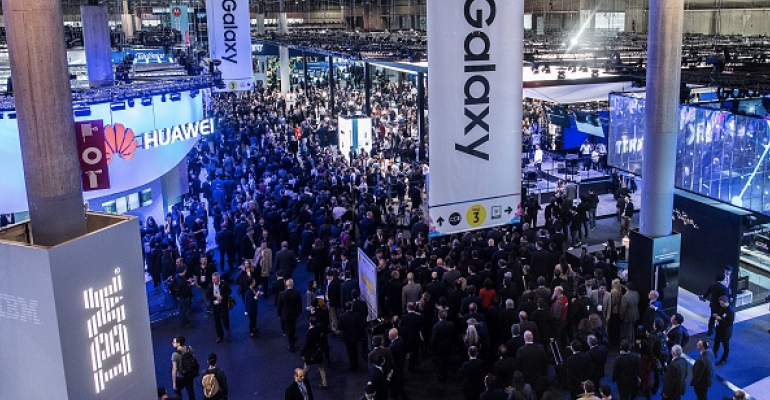While the 2024 edition of Mobile World Congress, which began on February 26 in Barcelona, still is not drawing as many attendees as it did before the Covid pandemic—109,000 people came in 2019 versus about 95,000 this year—it’s not because the rate of innovation in communications technology has slowed.
In fact, the effect of artificial intelligence on communications technology has brought innovations that most everyone, from consumers to meeting planners, would be interested to know about.
Among the 2,400 companies exhibiting on the 2-million-square-foot show floor, tech giants Apple and Google are among those showing off applications that are likely to be used in the business-events industry. First, Apple released its Vision Pro “mixed reality” headset three weeks ahead of the show and is having MWC attendees demo the device at its exhibit stand. The company says that as an alternative to the $1,000 Quest Pro virtual-reality headset from Meta, the $3,500 Vision Pro has been boosted by artificial-intelligence-derived programming such that it can deliver both augmented reality (overlaying data and graphics on a real environment) and virtual reality (immersion in a completely different environment) through the headset.
Here's a real-life example of potential meetings application: Chris Mix, executive creative producer for Mixperience, a visual storytelling and production-design firm, previously spent several years working on content and design elements for life-science meetings, using both AR and VR headsets in the process. He notes that AR headsets are often used to deliver training of sales reps where dynamic charts and data along with images and even short videos can appear around the speaker.
And for training doctors and nurses, VR headsets are used to simulate being in the room for medical procedures that were actually filmed ahead of a meeting, using at least six cameras from different angles to create a fully immersive experience in the VR headset, says Mix. In addition, those headsets can be shipped to non-attendees with instructions for use as well as a tech-support contact, allowing more healthcare professionals to have the same training experience.
Are Real-Feel Virtual Meetings Almost Here?
Another tech development that’s part of the “spatial computing” movement and advancing quickly due to artificial intelligence is Project Starline, an immersive three-dimensional virtual-meeting product under development by Google. (See image below.)
Although Google announced an initial version of Project Starline in 2021, “that prototype took up an entire room, requiring complex hardware such as infrared light emitters and special cameras to create a live 3D model of the person you were talking to,” the company said in a recent product update on its website. “While the results were impressive, the size and complexity of the system made it challenging to bring to many of today’s offices.” For the latest prototype, which was released about six months ago, Google “developed new A.I. techniques that only require a few standard cameras to produce higher quality, life-like 3D images. The prototype now resembles a more traditional videoconferencing system—going from the size of a restaurant booth to a flat-screen TV—that’s more deployable and accessible.” The company says the system still uses a light-field display to create a true three-dimensional image right across the user’s desk, without the need for glasses.
For the latest prototype, which was released about six months ago, Google “developed new A.I. techniques that only require a few standard cameras to produce higher quality, life-like 3D images. The prototype now resembles a more traditional videoconferencing system—going from the size of a restaurant booth to a flat-screen TV—that’s more deployable and accessible.” The company says the system still uses a light-field display to create a true three-dimensional image right across the user’s desk, without the need for glasses.
Qualitative studies of prototype users by Google found that this technology makes attendees more animated yet less fatigued over the course of a meeting. Participants also reported a significantly better ability to perceive and convey nonverbal cues than in traditional videoconferencing.
Google has not announced a release date for Project Starline. Perhaps Mobile World Congress 2025 could be the opportunity for the finished product to debut?

A.I. Is Accelerating Meetings-Related Tech
At Mobile World Congress 2024, the rapid advance of artificial intelligence is on display through “spatial computing” applications that will affect meetings, including augmented reality, virtual reality, and 3D teleconferencing.
0 comments
Hide comments




